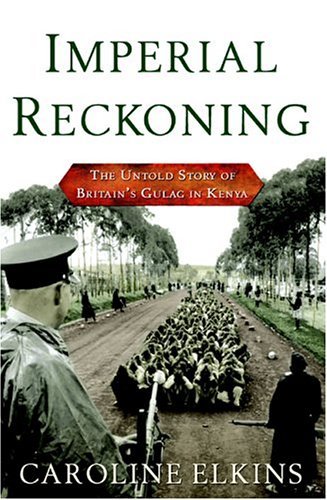Forty years after Kenyan independence from Britain, the words "Mau Mau" still conjure images of crazed savages hacking up hapless white settlers with machetes. The British Colonial Office, struggling to preserve its far-flung empire of dependencies after World War II, spread hysteria about Kenya's Mau Mau independence movement by depicting its supporters among the Kikuyu people as irrational terrorists and monsters.

Caroline Elkins, a historian at Harvard University, has done a masterful job setting the record straight in her epic investigation, Imperial Reckoning. After years of research in London and Kenya, including interviews with hundreds of Kenyans, settlers, and former British officials, Elkins has written the first book about the eight-year British war against the Mau Mau.
She concludes that the war, one of the bloodiest and most protracted decolonization struggles of the past century, was anything but the "civilizing mission" portrayed by British propagandists and settlers. Instead, Britain engaged in an amazingly brutal campaign of ethnic cleansing that seemed to border on outright genocide.
While only 32 white settlers were killed by Mau Mau insurgents, Elkins reports that tens of thousands of Kenyans were slaughtered, perhaps up to 300,000. The British also interned the entire 1.5 million population of Kikuyu, the colony's largest ethnic group, in barbed-wire villages, forced-labour reserves where famine and disease ran rampant, and prison camps that Elkins describes as the Kenyan "Gulag." The Kikuyu were subjected to unimaginable torture, or "screening," as British officials called it, which included being whipped, beaten, sodomized, castrated, burned, and forced to eat feces and drink urine.
British officials later destroyed almost all official records of the campaign. Elkins infuses her account with the riveting stories of individual Kikuyu detainees, settlers, British officials, and soldiers.
This is a stunning narrative that finally sheds light on a misunderstood war for which no one has yet been held officially accountable. --Alex Roslin, Campusi.com |
A major work of history that for the first time reveals the violence and terror at the heart of Britain's civilizing mission in Kenya. As part of the Allied forces, thousands of Kenyans fought alongside the British in World War II. But just a few years after the defeat of Hitler, the British colonial government detained nearly the entire population of Kenya's largest ethnic minority, the Kikuyu-some one and a half million people.
The compelling story of the system of prisons and work camps where thousands met their deaths has remained largely untold-the victim of a determined effort by the British to destroy all official records of their attempts to stop the Mau Mau uprising, the Kikuyu people's ultimately successful bid for Kenyan independence.
Caroline Elkins, an assistant professor of history at Harvard University, spent a decade in London, Nairobi, and the Kenyan countryside interviewing hundreds of Kikuyu men and women who survived the British camps, as well as the British and African loyalists who detained them.
The result is an unforgettable account of the unraveling of the British colonial empire in Kenya-a pivotal moment in twentieth- century history with chilling parallels to America's own imperial project
----------------------------------------------------------------------------------
Recent interview on NPR: http://www.npr.org/templates/story/story.php?storyId=4462900 |
 Home
Home Archives
Archives Home
Home Archives
Archives